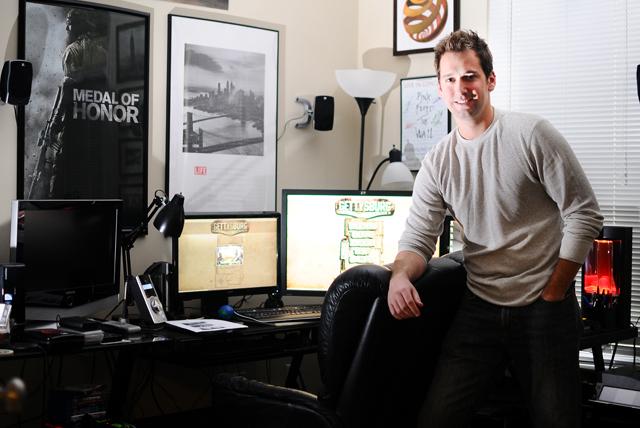
© 2011 NCSU Student Media
Independent developer Danny Green stands amongst the computers in his home office where he does the majority of work on his game, Gettysburg Armored Warfare, which will be released later this year. Photo by Luis Zapata
For some, the journey to publishing a game is long and arduous and for others, it seems to be a story of overnight success. For independent game developer Danny Green, however, it has been a journey fraught with triumphs and disappointments, but there is a light at the end of the tunnel.
His newest game, Gettysburg Armored Warfare, has been picked up by a large Swedish publisher called Paradox Interactive, and is set to be available online later this year as a free-to-play downloadable title.
Gettysburg Armored Warfare is a real-time strategy / first-person shooter hybrid, allowing players to strategically plan their battles from a zoomed out perspective, and then switch to playing as any of the soldiers on the field from a first-person perspective.
“GAW executes on a gameplay style I’ve been trying to perfect my entire life,” Green said, “the RTS/FPS hybrid.”
Green has combined this hybrid gameplay style with a story involving time travel, future technology and the Civil War in an effort to provide gamers with a unique experience, but the premise took some time to get just right.
“Paradox and I were trying to figure out how to have a second Civil War sometime in the future,” Green said, “But we couldn’t figure out a plausible way to make it work. Then we went into the world of weird science and time travel, and it all came together.”
GAW’s plot involves a rogue agent who travels back in time with future technology to change the outcome of the Civil War in favor of the Confederacy. But when the modern government finds out, they send back reinforcements to beef up Union forces.
“What we ended up with is an alternate version of the Civil War, this time fought with all kinds of future weapons, tanks and artillery,” Green said.
The game is currently in pre-alpha stage, with most of the gameplay systems in place with placeholder graphics and effects. The concept art is the only thing that’s completely finished, but it shows a game with a clear identity and vision. Things are looking up for Green’s one-man company, Radioactive Software, but it wasn’t always this way.
Green’s game development story began at age 10 when his father taught him how to program using C++. Green said that from an early age, he preferred computers to the usual kids stuff.
“There was just something about video games,” Green said. “There was a ball pit, yeah, and that was fun, but for me, Teenage Mutant Ninja Turtles, the four-player arcade game, was much more interesting.”
In college, Green created a game called Urban Empires, which was heavily influenced by the Grand Theft Auto series. He’d often stay up all night working on some interesting new feature and then call his father, excited to share the news.
“He’d tell me to focus on my classes,” Green said. “I knew the only way to earn his respect was to sign with an international publisher. So that’s what I did.”
During his junior year in college, Green signed a publishing deal with Strategy First, a well-known strategy game publisher at the time.
“I was 20,” Green said. “I couldn’t believe it.”
But the excitement was short-lived. After working on the game for many years, Strategy First went bankrupt, and the rights to Urban Empires are tied up in court to this day.
Green started work on his current project, then called simply Armored Warfare, in 2007, and approached various publishers about a deal over the next three years. In 2010, Paradox Interactive expressed interest and flew Green out to LA to show off the game.
“Paradox flew me out to LA for E3 and put me up in a 5-star hotel,” Green said. “I spent some of my last money on a G72 gaming laptop to really show off my game.”
But on the big day, Green’s brand new laptop wouldn’t boot up.
“After all I’d been through,” Green said, “I felt like I was going to blow my shot. But then at the show, we tried to turn it on one more time and like a miracle, it worked.”
In the end, Green’s presentation went well and Paradox decided to sign his company to an online publishing deal on the spot.
“They couldn’t believe I did everything myself,” Green said. “I was all calm until I got out of the room, and then I was yelling, ‘Yeah!’ at the top of my lungs.”
Now, Green still runs the company by himself, but Paradox has provided an infusion of cash, allowing him to hire worldwide talent to help him out.
“I have artists in Spain and Czechoslovakia, a voiceover guy in Boston, a concept artist in California and a project manager in Stockholm,” Green said. “And I do programming, particle systems, user interface and any other miscellaneous work to fill in the gaps.”
If all goes according to plan, Gettysburg Armored Warfare will be released as a playable online beta later this year.